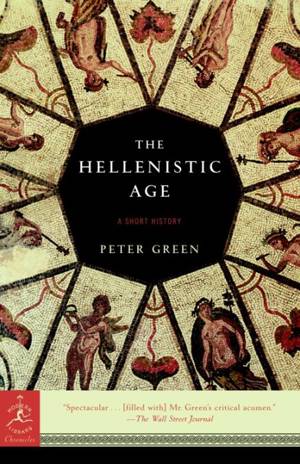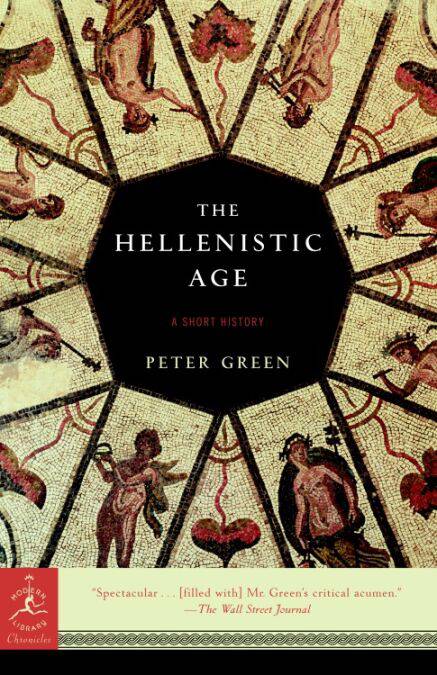
- Retrait en 2 heures
- Assortiment impressionnant
- Paiement sécurisé
- Toujours un magasin près de chez vous
- Retrait gratuit dans votre magasin Club
- 7.000.0000 titres dans notre catalogue
- Payer en toute sécurité
- Toujours un magasin près de chez vous
6,90 €
+ 6 points
Format
Description
The Hellenistic era witnessed the overlap of antiquity’s two great Western civilizations, the Greek and the Roman. This was the epoch of Alexander’s vast expansion of the Greco-Macedonian world, the rise and fall of his successors’ major dynasties in Egypt and Asia, and, ultimately, the establishment of Rome as the first Mediterranean superpower.
The Hellenistic Age chronicles the years 336 to 30 BCE, from the days of Philip and Alexander of Macedon to the death of Cleopatra and the final triumph of Caesar’s heir, the young Augustus. Peter Green’s remarkably far-ranging study covers the prevalent themes and events of those centuries: the Hellenization of an immense swath of the known world–from Egypt to India–by Alexander’s conquests; the lengthy and chaotic partition of this empire by rival Macedonian marshals after Alexander’s death; the decline of the polis (city state) as the predominant political institution; and, finally, Rome’s moment of transition from republican to imperial rule.
Predictably, this is a story of war and power-politics, and of the developing fortunes of art, science, and statecraft in the areas where Alexander’s coming disseminated Hellenic culture. It is a rich narrative tapestry of warlords, libertines, philosophers, courtesans and courtiers, dramatists, historians, scientists, merchants, mercenaries, and provocateurs of every stripe, spun by an accomplished classicist with an uncanny knack for infusing life into the distant past, and applying fresh insights that make ancient history seem alarmingly relevant to our own times.
To consider the three centuries prior to the dawn of the common era in a single short volume demands a scholar with a great command of both subject and narrative line. The Hellenistic Age is that rare book that manages to coalesce a broad spectrum of events, persons, and themes into one brief, indispensable, and amazingly accessible survey.
The Hellenistic Age chronicles the years 336 to 30 BCE, from the days of Philip and Alexander of Macedon to the death of Cleopatra and the final triumph of Caesar’s heir, the young Augustus. Peter Green’s remarkably far-ranging study covers the prevalent themes and events of those centuries: the Hellenization of an immense swath of the known world–from Egypt to India–by Alexander’s conquests; the lengthy and chaotic partition of this empire by rival Macedonian marshals after Alexander’s death; the decline of the polis (city state) as the predominant political institution; and, finally, Rome’s moment of transition from republican to imperial rule.
Predictably, this is a story of war and power-politics, and of the developing fortunes of art, science, and statecraft in the areas where Alexander’s coming disseminated Hellenic culture. It is a rich narrative tapestry of warlords, libertines, philosophers, courtesans and courtiers, dramatists, historians, scientists, merchants, mercenaries, and provocateurs of every stripe, spun by an accomplished classicist with an uncanny knack for infusing life into the distant past, and applying fresh insights that make ancient history seem alarmingly relevant to our own times.
To consider the three centuries prior to the dawn of the common era in a single short volume demands a scholar with a great command of both subject and narrative line. The Hellenistic Age is that rare book that manages to coalesce a broad spectrum of events, persons, and themes into one brief, indispensable, and amazingly accessible survey.
Spécifications
Parties prenantes
- Auteur(s) :
- Editeur:
Contenu
- Nombre de pages :
- 240
- Langue:
- Anglais
- Collection :
Caractéristiques
- EAN:
- 9781588367068
- Date de parution :
- 12-05-08
- Format:
- Ebook
- Protection digitale:
- Adobe DRM
- Format numérique:
- ePub

Seulement chez Librairie Club
+ 6 points sur votre carte client de Librairie Club
Les avis
Nous publions uniquement les avis qui respectent les conditions requises. Consultez nos conditions pour les avis.






